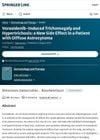 2 citations,
June 2022 in “Journal of cosmetic dermatology”
2 citations,
June 2022 in “Journal of cosmetic dermatology” Dupilumab can help hair regrowth but may also trigger alopecia areata.
19 citations,
January 2021 in “Journal of the American Academy of Dermatology” Dupilumab may help children with alopecia areata and atopic dermatitis regrow hair.
 July 2023 in “International journal of trichology”
July 2023 in “International journal of trichology” Injectable platelet-rich fibrin may stop hair loss from Discoid lupus erythematosus.
[object Object] 70 citations,
April 2011 in “British journal of dermatology/British journal of dermatology, Supplement” Methotrexate sometimes helps regrow hair in children with severe alopecia areata and is generally safe.
 63 citations,
September 2009 in “Regenerative Medicine”
63 citations,
September 2009 in “Regenerative Medicine” Scientists found a way to grow human hair cells in a lab that can create new hair when transplanted.
25 citations,
March 2017 in “International Journal of Dermatology” Ruxolitinib effectively and safely regrows hair in alopecia patients.
 22 citations,
October 2018 in “Aesthetic Plastic Surgery”
22 citations,
October 2018 in “Aesthetic Plastic Surgery” Understanding hair follicle biology and stem cell control could lead to new hair loss treatments.
13 citations,
May 2021 in “FASEB bioAdvances” Plant-based products can improve hair and skin health without harmful side effects.
9 citations,
May 2016 in “Clinics in dermatology” Phototherapy can help treat hair loss in alopecia areata.
 8 citations,
June 2022 in “Frontiers in Medicine”
8 citations,
June 2022 in “Frontiers in Medicine” Both individual and combined treatments of tofacitinib and corticosteroids can help regrow hair in moderate-to-severe alopecia areata, but ongoing treatment may be necessary.
 7 citations,
September 2018 in “Journal of cosmetic dermatology”
7 citations,
September 2018 in “Journal of cosmetic dermatology” A patient had painful swollen lymph nodes after a cosmetic skin and hair treatment, suggesting doctors should warn about this risk.
3 citations,
September 2021 in “EClinicalMedicine” ALRV5XR effectively increases hair density in men with androgenetic alopecia without adverse effects.
 3 citations,
May 2008 in “Hair transplant forum international”
3 citations,
May 2008 in “Hair transplant forum international” Common hair loss disorders may not need stem cell therapy, but could benefit from other treatments like hair cycle control and immune restoration therapy.
 1 citations,
April 2017 in “Journal of Investigative Dermatology”
1 citations,
April 2017 in “Journal of Investigative Dermatology” Tofacitinib may help regrow hair in severe alopecia areata, but results differ greatly between people.
 September 2023 in “Journal of the Dermatology Nurses’ Association”
September 2023 in “Journal of the Dermatology Nurses’ Association” Platelet-Rich Plasma (PRP) may be a safe and effective treatment for hair loss caused by Alopecia Areata.
 August 2023 in “Indian journal of pediatrics/Indian Journal of Pediatrics”
August 2023 in “Indian journal of pediatrics/Indian Journal of Pediatrics” Topical treatments helped a child with Down syndrome and severe hair loss regrow most of his hair.
 January 2013 in “Российский журнал кожных и венерических болезней”
January 2013 in “Российский журнал кожных и венерических болезней” Androgenic alopecia, a common hair loss condition, is linked to changes in androgen metabolism and genetics, and can be treated with finasteride and minoxidil, but these treatments are only fully effective in 10% of patients.
 25 citations,
August 2017 in “Lasers in Medical Science”
25 citations,
August 2017 in “Lasers in Medical Science” Fractional lasers seem effective and safe for treating hair loss, but more research is needed to find the best treatment methods.
 November 2024 in “Skin Health and Disease”
November 2024 in “Skin Health and Disease” Minoxidil is effective for promoting hair growth and has various dermatological uses.
143 citations,
January 2004 in “Journal of Investigative Dermatology Symposium Proceedings” Alopecia areata is an autoimmune disease causing hair loss, treatable with immune-modulating drugs, and linked to genetics.
 August 2024 in “Dermatology and Therapy”
August 2024 in “Dermatology and Therapy” Vorasidenib can cause unusual hair growth.
 53 citations,
March 2014 in “Cold Spring Harbor Perspectives in Medicine”
53 citations,
March 2014 in “Cold Spring Harbor Perspectives in Medicine” The document explains different types of hair loss, their causes, and treatments, and suggests future research areas.
 5 citations,
June 2019 in “Open Forum Infectious Diseases”
5 citations,
June 2019 in “Open Forum Infectious Diseases” Six African American women experienced hair loss after switching to a new HIV medication.

Modern skin cancer treatments can cause skin side effects and hair loss, affecting patients' quality of life.
 July 2022 in “Singapore Medical Journal”
July 2022 in “Singapore Medical Journal” Most children with alopecia areata improved with treatment, but those with more hair loss had worse outcomes.

The document concludes that current treatments for androgenic alopecia are not fully effective, but new therapies like botulinum toxin and PRP show promise, and future gene therapy could be beneficial.
September 2015 in “Advances in small animal medicine and surgery” Deslorelin can help regrow hair in most intact male dogs with alopecia.
 April 2024 in “Liječnički vjesnik”
April 2024 in “Liječnički vjesnik” Modern treatments can effectively regrow hair and improve life for people with alopecia areata.
 May 2010 in “Journal of the Dermatology Nurses' Association”
May 2010 in “Journal of the Dermatology Nurses' Association” Cicatricial alopecia causes permanent hair loss and is treated to relieve symptoms and stop progression.
[object Object]  34 citations,
April 2009 in “Expert Opinion on Pharmacotherapy”
34 citations,
April 2009 in “Expert Opinion on Pharmacotherapy” Some treatments work for common baldness, but there's less evidence for other hair loss types, and more research is needed.






















